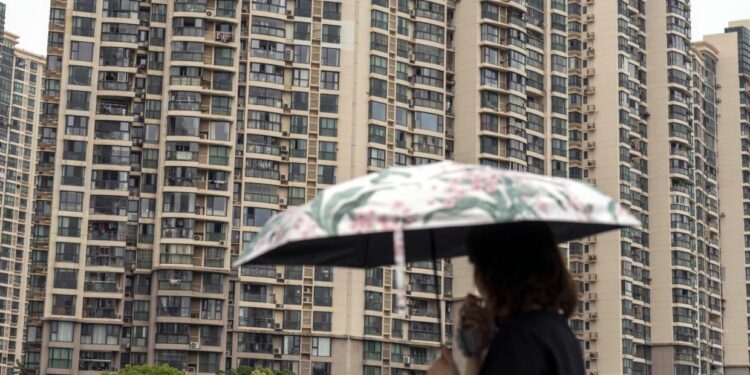How has the tightening of credit conditions in China affected potential buyers in the real estate market?
China’s real estate market has been experiencing a prolonged slump despite continuous efforts to stimulate home sales. The slowdown in the property sector has raised concerns about the overall health of the Chinese economy and has prompted policymakers to take various measures to support the market.
Key Factors Contributing to China’s Home Sales Slump:
- Economic Slowdown: China’s economy has been facing challenges in recent years, with growth rates slowing down. This has had a direct impact on the real estate market, as potential buyers are more hesitant to make large investments in property.
- Government Regulations: The Chinese government has implemented various tightening measures in response to soaring property prices, including restrictions on multiple property purchases and increased down payment requirements. While these regulations have helped curb speculative activities, they have also dampened overall sales.
- Oversupply of Housing: Many Chinese cities are facing an oversupply of housing, leading to a glut in the market. This surplus of inventory has put downward pressure on prices and has made it difficult for developers to sell their properties.
- Credit Tightening: The tightening of credit conditions in China has made it more difficult for potential buyers to secure mortgage financing. This has further dampened buyer demand and has contributed to the overall slowdown in home sales.
Despite these challenges, the Chinese government has been proactive in implementing various measures to support the real estate market and stimulate home sales. Some of the key initiatives include:
- Interest rate cuts to reduce borrowing costs for homebuyers
- Relaxation of residency requirements for property purchases in certain cities
- Implementation of targeted stimulus measures to support the construction sector
However, the impact of these measures has been limited, and the home sales slump in China persists. As a result, developers are facing increasing pressure to reduce prices and clear their inventory, while potential buyers remain cautious amid economic uncertainties.
Benefits and Practical Tips for Buyers in China’s Sluggish Real Estate Market:
- Bargain Hunting: With prices softening in many areas, buyers have the opportunity to negotiate favorable deals with developers or resellers.
- Long-term Investment: Real estate has historically been a solid investment in China, and buyers with a long-term perspective may still benefit from appreciation over time.
- Due Diligence: It is important for buyers to conduct thorough research on the property market, including location, price trends, and developer reputation, before making a purchase.
Case Study: First-Hand Experience of a Homebuyer in China’s Slumping Market
Mr. Li, a middle-class worker in Beijing, recently purchased a two-bedroom apartment in a suburb of the city. Despite the overall slowdown in the property market, Mr. Li decided to take advantage of the lower prices and favorable financing conditions to make his purchase. He conducted extensive research on the local market, consulted with real estate agents, and negotiated a good deal with the developer. Mr. Li is optimistic about the long-term prospects of his investment and believes that the property will appreciate in value over time.
China’s home sales slump persists despite efforts to stimulate the market. While challenges remain, there are opportunities for buyers to take advantage of the current conditions and make informed decisions when purchasing property. By conducting due diligence, negotiating effectively, and adopting a long-term perspective, buyers can navigate the sluggish real estate market in China and potentially benefit from their investments.
The Decline of China’s Residential Real Estate Market in July
Recent data shows that the residential real estate market in China experienced a further decline in July, despite significant efforts to support the industry. The value of new-home sales from the top 100 real estate companies dropped by 19.7% compared to the previous year, totaling around 279 billion yuan (US$38.6 billion). This decline was steeper than June’s 17% drop, indicating a worsening situation.
Transaction volumes also saw a significant decrease, plummeting by 36.4% from June levels after experiencing some growth in April and May. These numbers highlight how China’s recent measures to boost the property market have not yielded the desired results. Buyer confidence has been affected, especially after a key Communist Party meeting failed to introduce more robust support measures.
In response to the downturn, several Chinese cities have lifted price guidance restrictions to align more closely with market demands. For example, Zhengzhou city in Henan province recently eliminated guide prices for new homes, allowing developers to set their own prices for transactions. Similar actions were taken by cities like Shenyang, Lanzhou, and Ningde earlier this year.
Despite these efforts, China’s real estate sector continues to weigh on overall economic growth projections for this year. Economists at Bloomberg estimate that growth will fall short of the government’s target of 5%. Additionally, Chinese developer stocks have seen a decline of 21% this year.
Moreover, there is an increasing challenge in clearing housing inventory across various cities in China. Data from China Index Academy shows that it now takes an average of 21.3 months to destock homes – an increase of 3.9 months since May.
Looking ahead, two credit ratings agencies have revised their forecasts for China’s property market downwards as uncertainty looms over its recovery prospects.














